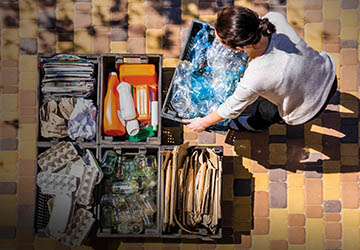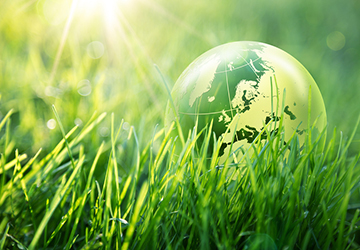How to Build a Sustainable Lifestyle and Lower Your Environmental Impact
Living sustainably is becoming increasingly important as we recognize our actions' environmental impact. To live a healthy and eco-friendly lifestyle, you must adopt some precautions. This article will teach you various strategies to improve your lifestyle and maintain and lower the environment's carbon footprint.

Utilise less, recycle more.
Sometimes, excessive use of something requires careful use of a product. In the same way, You can create an environmentally friendly way of life and lower your ecological footprint by minimizing, reusing, and discarding, which can reduce environmental pollution as much as possible. These practices are easy to implement daily and can significantly impact the environment. Here are some specific ways you can reduce, reuse, and recycle:
● Opting for reusable bags, water bottles, and coffee cups instead of disposable ones can be a cost-effective and environmentally-friendly way to minimize waste.
● Say no to single-use plastics like straws, utensils, and bags. As we all know, plastics take hundreds of years to decay and are one of the main reasons for environmental pollution.
● Buy second-hand clothes and furniture instead of new ones. It can help to solve environmental pollution issues as less production leads to less disposal of raw material wastes and after-waste of used products.
● Recycle paper, plastic, glass, and metal. Many cities and towns offer recycling programs, making proper disposal of these materials easy.
It would help if you navigated your lifestyle in an environmentally friendly way, adopting all the good habits and applying your strategies daily. Adopting these habits in your everyday life can contribute to a healthier environment while benefiting from long-term cost savings. Start small and gradually incorporate these habits into your life, and you'll be on your way to building a sustainable lifestyle.
Conserve Energy
Saving the energy of your daily use helps you economically and creates a better and healthy environment for you and your family to live in. Following are the strategies that can help you to make less use of energy:
● Never leave your lights, fans, home appliances, and other electronic devices switched on when not in use to save maximum energy. Even when turned off, appliances and electronics can still use small amounts of energy, so unplugging them when not in use can save even more power.
● Buy your home appliances according to the new energy-saving technologies and far more productive. They consume up to 75% less electricity than conventional fluorescent bulbs. They may cost a bit more, but long-term energy savings make them worthwhile.
● Use a programmable thermostat: You may use a programmable thermostat to regulate the temperature of your house at specific times. This can help you save energy by adjusting the temperature when you're not at home or asleep.
● Install solar panels: Installing solar panels can be a sustainable solution for generating renewable energy and decreasing your dependence on non-renewable fossil fuels. While the upfront costs may be high, the long-term benefits of energy savings and environmental impact can be significant.

Eat a Plant-Based Diet
If you want a healthy environment and body, you should switch your diet to vegetarian. Eating more veggies can reduce the level of environmental impact. The production of animal products requires vast amounts of energy, land, and water, and it is a significant source of greenhouse gas emissions. Here are some tips to help you transition to a plant-based diet:
● Focus on whole foods: Making whole foods, including an assortment of fruits, vegetables, whole grains, and legumes, a priority in your diet can furnish your body with the vital nutrients required for optimal health. These foods are also packed with fiber and antioxidants that can boost your health and prevent chronic diseases.
● Replace meat with plant-based protein sources: Tofu, tempeh, and seitan are great sources of protein that can replace meat in your meals. These plant-based protein sources are cholesterol-free and low in saturated fat, making them healthier options for your heart and overall health.
● Try new plant-based recipes: Experimenting with plant-based recipes and cuisines can help you discover new flavors and meal ideas. You can find many delicious plant-based recipes online or in cookbooks.
● By incorporating small adjustments to your dietary habits, you can promote your health while minimizing your ecological footprint. Eating a plant-based diet is a win-win for both you and the planet.
Use environmentally friendly transportation
Transportation is one of the main causes of environmental pollution as it discharges harmful chemicals into the environment, making the atmosphere unpure day by day, which may also lead to drastic climatic changes. Several strategies are needed to maintain an eco-friendly environment and good health.
Here are some practical ways to do so:
● Opt for walking, cycling, or utilizing public transportation instead of driving: Use non-motorized modes such as walking or biking. If you want to visit a far-off place, you should consider traveling by public transport like local buses, high roofs, trains, or subways, which can reduce the environmental impact.
● As transports powered by gases emit harmful chemicals into the environment, we should switch to hybrid vehicles if driving personally is essential.
● Sharing your rides or giving lifts to your friends can not only be convenient for them but also saves energy and reduces the emission of gases from multiple vehicles.
● You can also try to organize carpooling or ride-sharing with your coworkers or friends to reduce the number of cars on the road.
Incorporating these practices can significantly reduce your carbon footprint while traveling and contribute towards building a sustainable lifestyle.
Eliminate Water Wastage
Water is one of the most essential natural resources for human survival. Its depiction can lead to severe water crises making it our prime purpose to save water as much as possible by reducing its waste and consumption. The following are strategies for doing so:
● Don't leave open pores in your water pipes and drains to save maximum clean water. Leaks can potentially waste a considerable amount of water over time; hence, it is crucial to address and repair them promptly.
● Install low-flow showerheads and faucets. Such tools can help in saving the maximum amount of water without compromising its usage for your needs.
● Gardening requires you to water your garden daily, but if you do it during sunlight, most of it will evaporate, so water your plants or garden at night or early in the morning. This will help secure that your plants get the water they need without wasting excess water due to evaporation during the hottest parts of the day.
● To gather rainwater for use in your garden or other outside spaces, build a system that harvests rainwater. This is a great way to reduce your reliance on municipal water supplies and can also help reduce stormwater runoff.
● Use a broom as an alternative to a hose to clean outdoor areas like driveways and patios. This can help save maximum water and is a more environmentally friendly way to clean these areas.
So these strategies can be beneficial for conserving maximum amounts of water without reducing its essential uses if you implement them daily.


